 Petzlover
PetzloverBelgian Griffon is originated from Belgium but Nebolish Mastiff is originated from Canada. Belgian Griffon may grow 16 cm / 6 inches shorter than Nebolish Mastiff. Belgian Griffon may weigh 194 kg / 427 pounds lesser than Nebolish Mastiff. Both Belgian Griffon and Nebolish Mastiff has almost same life span. Belgian Griffon may have less litter size than Nebolish Mastiff. Belgian Griffon requires Moderate Maintenance. But Nebolish Mastiff requires Low Maintenance
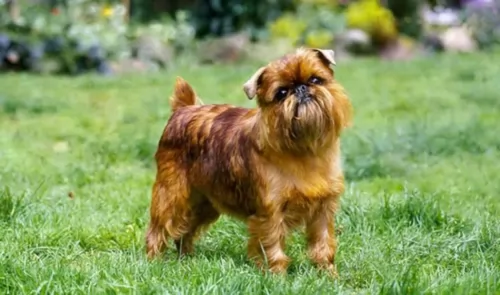 The Belgian Griffon isn’t your most attractive dog, but maybe its his quirky, gremlin looks that makes him such an adored pet for many. There are different varieties of Griffon, and the Belgian- and Brussels Griffon are one and the same. All small Belgian dogs have the same breed standards, with the Belgian having a rough coat The dog hails from Belguim and its ancestors were no doubt a mix of the Belgian street dog, the Stable Griffon and the Affenpinscher.
The Belgian Griffon isn’t your most attractive dog, but maybe its his quirky, gremlin looks that makes him such an adored pet for many. There are different varieties of Griffon, and the Belgian- and Brussels Griffon are one and the same. All small Belgian dogs have the same breed standards, with the Belgian having a rough coat The dog hails from Belguim and its ancestors were no doubt a mix of the Belgian street dog, the Stable Griffon and the Affenpinscher.
Later on in the 1800s, this combination was then crossed with the Pug, giving the dog the brachycephalic or flat faced look.
Unfortunately no written records were kept about the precise origin of this breed, but there is also the idea that the King Charles- and English Toy Spaniel were also involved in its development. These small dogs were bred to catch rats in the barns of European estates.
With the Mastiff breeds, the rarest and the smallest is the Nebolish Mastiff. Bred to be more agile than the giant mastiffs, the Nebolish was developed in Canada. They were developed by crossing several breeds, such as the English Mastiff, Neapolitan Mastiff, Dogue de Bordeux, Bull Terrier, Bullmastiff, Boxer, St. Bernard, and Deutsche Dogge. Perhaps there was some Great Dane as well. It was also hoped that they would have better health than the rest of the Mastiff breeds.
There are also those who believe the Nebolish Mastiff is not a Canadian crossbreed but rather the re-creation of the giant dogs that lived with the soldiers of Alexander the Great. Still others believe the breed is still being developed and no standard is yet true. They believe the dog is a hybrid. No one knows the exact breeding lines today and not many are breeding the Nebolish today. Thus, the dog is extremely rare.
Only the American Breeder Association (ABA), the Canada Molosser Association (CMA) and the Dog Registry of America Inc. (DRA) recognize the Nebolish Mastiff as a separate breed.
These dogs are courageous, loyal and dignified like all Mastiffs. They are protective of their families or their flocks. They are loving, intelligent and even-tempered. They are known to be great with kids since they are patient and calm – easy to train.
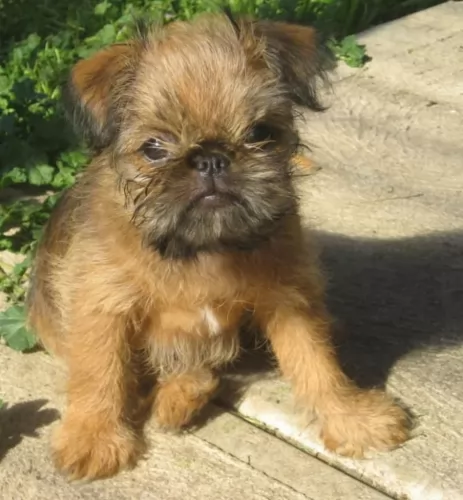 There are different variations of this dog to give it its distinctive look and size. This quaint looking little Griffon canine comes with two different coat types - soft or wiry. With the Belgian Griffon, his wiry coat of red, tan or black will need to be brushed at least twice a week. Shedding with this dog is seasonal.
There are different variations of this dog to give it its distinctive look and size. This quaint looking little Griffon canine comes with two different coat types - soft or wiry. With the Belgian Griffon, his wiry coat of red, tan or black will need to be brushed at least twice a week. Shedding with this dog is seasonal.
He has a compact, sturdy little body, and he trots around with attitude. With his sharp pointed ears and whiskers, he has been given the nickname ‘bearded dog’. His dark black eyes are alert. He is self-confident, intelligent and curious breed, a great family pet and good with children if he has grown up with them in the home. He is good with other pets. The fact that this is a small breed and that he doesn’t have excessive energy levels, means he is adaptable to city- and country living.
The Nebolish Mastiff is very much like all other mastiffs with the exception of height and weight. He has a large head, long legs, strong neck, oval shaped paws, wide chest and large bones. He has solid muscles, large ears and a wide snout. They usually weigh anywhere between 43 and 82 kg. They tend not to slobber like the other mastiff breeds as a result of their breeding. They have a black mask and tail may or may not be docked.
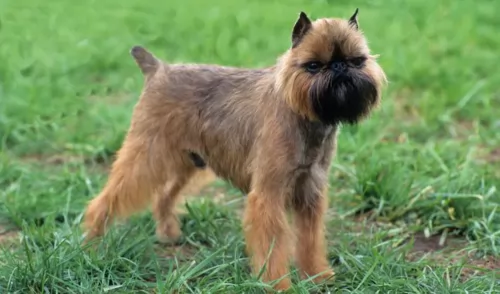 The Belgian Griffon is an affectionate pet and often establishes a strong bond with one member of the family. You’ll have your Griffon with you for about 15 years so make sure he is trained and a pleasure to have around.They are difficult to train, being somewhat stubborn so they are going to require patience. They’re sensitive too, and they won’t respond well to aggressive treatment.
The Belgian Griffon is an affectionate pet and often establishes a strong bond with one member of the family. You’ll have your Griffon with you for about 15 years so make sure he is trained and a pleasure to have around.They are difficult to train, being somewhat stubborn so they are going to require patience. They’re sensitive too, and they won’t respond well to aggressive treatment.
They’re much more indoor dogs than outdoor dogs because they’re also vulnerable to heat stroke. They just want to come indoors and be with their human family, and when you do that for them, they’ll become a wonderful friend and companion to you.
Yes, they are very good with children.
Agility and swimming
No – they don’t do well with apartments and small spaces. They need a large fenced in yard.
High but can be stubborn
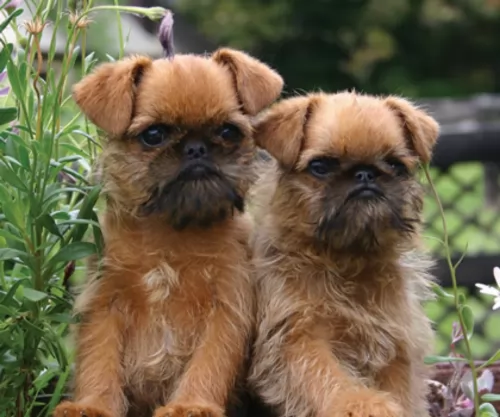 When you get your Griffon from a reputable breeder, you always have a better chance that he’ll be healthy. As it is, the Belgian Griffon has few hereditary health issues. However his dark eyes will have some genetic problems to contend with and he could suffer with progressive retinal atrophy. This is an illness which can lead to blindness
When you get your Griffon from a reputable breeder, you always have a better chance that he’ll be healthy. As it is, the Belgian Griffon has few hereditary health issues. However his dark eyes will have some genetic problems to contend with and he could suffer with progressive retinal atrophy. This is an illness which can lead to blindness
Syringomyelia – this is a neurological condition – an abnormality of the spinal cord – a disease which occurs more frequently in small breeds. It can cause your pet to endure a lot of pain.
Birthing Issues - these little dogs often have problems with giving birth, and a vet often has to intervene and perform a cesarean.
Bred to be much healthier than other mastiff breeds, the Nebolish has very few health concerns. They live twice as long as most other Mastiff and giant breeds at up to 14 years. The most often reported health issue is:
bloat – where the intestines and stomach organs are twisted or distended. Bloat can be deadly so don’t hesitate on treatment. Avoid it by not overfeeding after or before exercise.
Test for Hip dysplasia as it can cause lameness or arthritis.
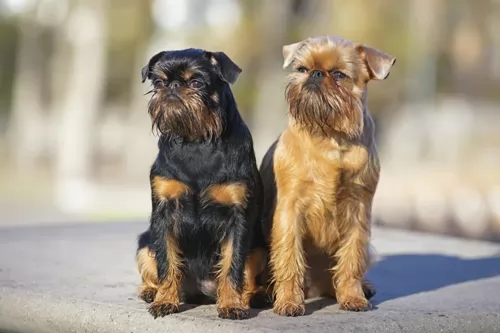 The Belgian Griffon will do well if you invest in high quality foods. You can make your own, but if you’re concerned about his health, it would be best to check what ingredients should go into his home-prepared meals to ensure he gets all the vitamins and minerals he needs.
The Belgian Griffon will do well if you invest in high quality foods. You can make your own, but if you’re concerned about his health, it would be best to check what ingredients should go into his home-prepared meals to ensure he gets all the vitamins and minerals he needs.
If you want to go with commercially manufactured dog foods, check with your vet about wet- and dry foods. Your vet will help with choosing a food appropriate to his size and age. Always ensure that there is clean, fresh water available to your pet.
Even though he is a small breed, he is fairly active and he will need his fair share of exercise like ball games and walks. Training and socialization are a must for him. You’ll notice that training isn’t particularly easy with this breed, and first time dog owners might not have the patience with him.
Don’t overfeed and don’t feed too much protein in the first year. Feed 1-2 cups in two meals.
bloat – Tendency to become obese so don’t over feed. About 2-3 cups in 2 meals per day.
agility and flexibility
This intelligent breed actually enjoys training, toys and all kinds of mentally stimulating puzzles. They love water and are very good swimmers. They need an average amount of exercise - a couple walks per day. Need a large fenced yard. They make great therapy dogs and play catch.